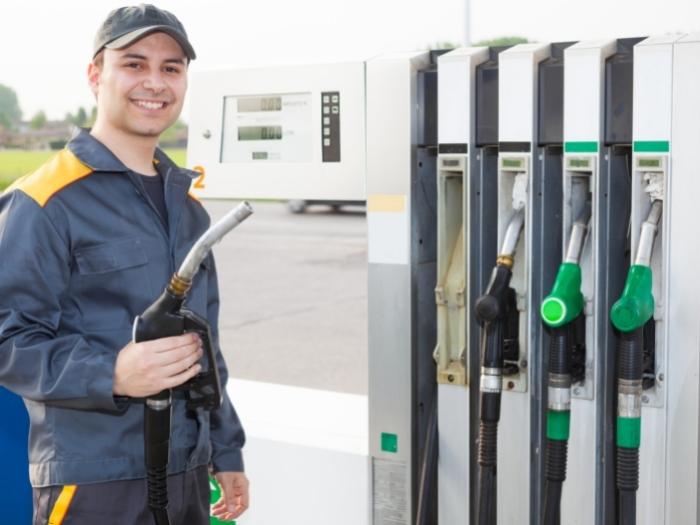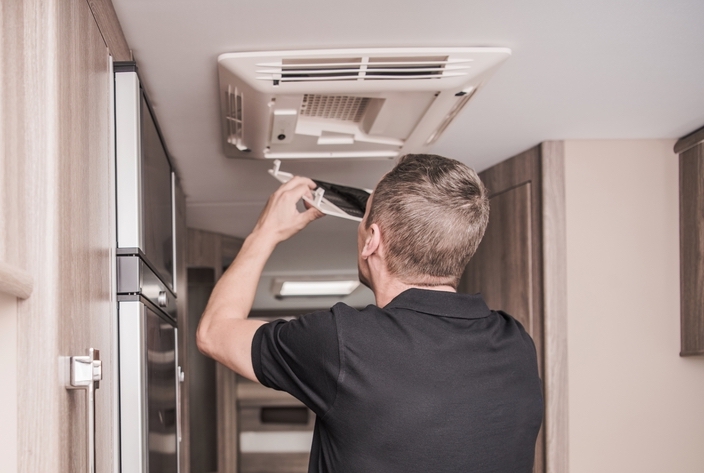How Far Can an RV Go on a Tank of Gas?
NOTE*** The content on this page may contain affiliate links, we may make a commission. And, as an Amazon Associate, we earn from qualifying purchases. More information: disclosure page.
When you are planning an RV trip you need to take many things into consideration. You wouldn’t want to be stopped in the middle of the road just because you ran out of gas, right? One of the most important is how far can you travel with your RV in a tank of gas.
In general, a class A motorhome with an 80 to 150-gallon tank will travel as far as 500 to 1,900 miles on a tank of gas. On the other hand, a smaller class C with a 25 to 55-gallon tank will go 345 to 900 miles.
The distance in which an RV can travel on a tank of gas varies on the fuel efficiency and tank size of your rig. If you prefer to look a the numbers in comparison, below is the average distance different classes of RVs can go on a tank of gas:
- Class A Motorhome – 500 -1,900 miles on a tank of gas
- Class B Motohome : 450 – 625 miles on a tank of gas
- Class C Motorhome: 345 to 900 miles on a tank of gas
Each RV has different sizes of tanks that can be filled from 20 to 150 gallons. To help you have a better understanding, I’ll tell you the detailed tank sizes of each type of RVs you may have. Plus, some tips on how you can save gas when you travel.
Average RV Tank Size and Their Gas Mileage

RVs have three different types. Class A, Class B, and Class C. Although these three have different features and sizes, there’s one of them that would fit depending on what kind of RVer you are.
When it comes to the tank size, if the RV is bigger, then it will also come in a bigger size tank. If the RV size is smaller, then the tank size will be small too. But to be more specific, here are the average tank sizes of each type of RVs and their gas mileage.
| RV Class | Class A | Class B | Class C |
| Gas Tank Size | 80 to 150 gallons | 20 -25 gallons | 24- 55 gallons |
| Average Miles Per Gallon | 8-13 MPG | 18- 20 MPG | 17-22 MPG |
| Distance on 1 tank of Gas | 560 – 1,950 Miles | 450 to 625 miles | 336 – 990 miles |
- Class A Motorhome
Class A motorhome is the biggest among the three motorhomes with a size that ranges from 25 to 45 feet and weighs 13,000 to 30,000 pounds. This type of motorhome has the largest tank size that ranges from 80 to 150 gallons depending on its make and model. Therefore, you can travel as far as 560 to 1,950 miles with it.
- Class B Motorhome
While the class A motorhome is the largest, the class B motorhome is the smallest among the three. Its size ranges from 17 to 23 feet with a weight of 4,000 to 9,000 pounds. That is the reason why it is also called a campervan. Since its size is the same as the other regular vehicle.
Class B motorhome has the smallest tank so it can only fill 25 gallons. However, you can still go as far as 450 to 625 miles with it so it is still not that bad especially if you don’t need to travel farther than 600 miles.
- Class C Motorhome
If class A is the largest and class B is the smallest, class C motorhome is in the middle of the two. It’s not as big as class A but not as small as class B. Its size ranges from 20 to 30 feet with around 10,000 to 13,000 pounds and can fill 24 to 55 gallons of gas. This rig can go as far as 560 to 1,440 miles.
5 Tips to Save Fuel With Your RV
One of the reasons why owning an RV is expensive is because of the cost of fuel plus its consumption. Of course, it shouldn’t stop you from enjoying and experiencing an RV life. There are plenty of ways to save money by increasing your fuel efficiency. So here are five tips to help save fuel with your RV.
Always Plan Your Route
Before you hit the road, you can plan which route you’ll take. It will help with your fuel efficiency with the help of a gas mileage calculator. There are many gas mileage calculators that you can use online.
Do A Maintenance Check With Your Rig
Always do a maintenance check on your rig before driving. Especially if you haven’t used it for a while.
There is a possibility that it will have a clogged filter. Which can cause a high amount of fuel to the cylinder. Another problem is that a faulty H2O Sensor can reduce your mileage per gallon from up to 40 percent and an improperly tuned RV up to 20 percent.
Decrease The Weight of Your RV
The heavier your rig is, the higher fuel it consumes. But it is so easy to load all your favorite camping toys in there!! Plus having some water is very convenient.
Pro tip: travel with empty tanks and fill up near your camp spot.
So if you want to save up your fuel, one of the best things to do is unload unnecessary things and make your rig as light as possible.
Use Your Air Conditioner Only When Necessary
Your vehicle AC is run by the power of the engine and uses extra gas. Anytime you turn on the AV on your dash you reduce your fuel economy up to 25%. Yikes! Instead, roll down the windows.
You can also use the rooftop AC to cool the RV while driving.
Further reading: Can an RV AC Run All Day?
Keep A Steady Speed When Driving
When you drive fast and stop fast you use too much energy to consume a lot of fuel.
Pro Tip: Slow to accelerate and slow to stop
Keeping a steady speed when driving helps you a lot to increase your fuel efficiency. It can help you save up to 30 percent of your fuel consumption
Which Fuel for an RV Motorhome is Better: Gas or Diesel?

When choosing between a gas or diesel engine motorhome there are a few things that you might want to consider. Because both can be good depending on your situation. To know whether gas or diesel is better for you, see the following factors that you should consider:
- How Often You Are Going To Travel With Your RV
When choosing between a gas or a diesel engine motorhome, you need to ask yourself how often you’re planning to travel.
Are you a seasoned traveler? Will you only go traveling in your RV once a month then will let your rig sit in your garage for a long time? If yes, then a gas motorhome engine would be perfect for you since you won’t consume that much gas.
If you will go full-time, choosing a diesel motorhome is much better. It’s best if you would like to maximize your engine power and efficiency. However, the diesel engine can be more expensive to buy and to fix.
- How Much Is Your Budget
Although you already know that a diesel motorhome is more expensive than gas, you still have to look at it in a bigger picture.
High-end gas motorhomes have almost the same price as the lower quality diesel. But you can see a big difference between the two. Thus, if you want to save money and still have a high-end coach then buying a high-end gas motorhome is great for you.
Alternatively, if you have the budget to buy an RV, of course, a high-end diesel motorhome is what I can recommend.
- Which of The Two Have Best Features
Since diesel motorhomes are much more expensive than gas. You can see why, with the amazing interiors and amenities for your comfort. Although high-end gas motorhomes can offer the same thing. But it’s not as good as the diesel can offer.
How To Store Fuel In An RV
I have run out of gas on the road. It’s not pretty! So I always store a little extra fuel on the RV. or tow vehicle. I carry a can of fuel for the generator and a separate can of diesel for the RV.
You have to make sure that you’ll just use an approved container. Because if not, it will cause a dangerous situation when filling and traveling. The container should be Underwriters Laboratories (UL) or Factory Mutual (FM) approved safety cans. These come in different sizes and must be placed on a 30-degree slope.
If you are renting an RV it is always a good idea to meet the owners and ask these questions. You can then ask for tips from them. Whether you are allowed to store fuel in their RV will be up to them and is a good idea to add to your questions.
Looking for where you can rent? Check Outdoorsy, RVezy, and RVShare. Here are some posts for further reading:

Final Thoughts on How Far Your RV Can Go on a Tank of Gas
To sum things up, if you want to have a recreational vehicle that you can use for full-time RVing, a class A diesel motorhome might be perfect for you. It is also the recommended type of coach to use in traveling across the country, going on terrain, nor any other roads that will need a powerful engine.
On the other hand, if you just want to travel once or twice a month, you can have whatever type of RV. Just make sure that you do a proper maintenance check after having it stocked for a while.
Lastly, how far can an RV go on a gas tank will depend on how far you’re going to use it most efficiently. If you follow the tips that I have shared, you can save up to 40 percent of your mileage per gallon. Regardless of what size of tank your RV has.
For more RV travel tips, read these posts:
- 25 Expert Tips for Renting an RV for the First Time
- 17 Key Questions to Ask Before Renting an RV for Your Family Vacation
- 9 Foolproof Ways to Rent a Cheap RV in 2021 (+Coupons)

Hi, I’m Shauna – Welcome to Family Travel Fever. We are a large family, that was bitten by the travel bug! I take the kids by myself because I don’t mind flying or driving solo with my crew to discover the coolest places.
Sign up for our email list for my best travel tips plus get the family travel planner free.







